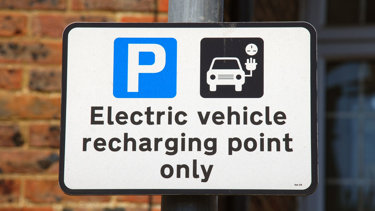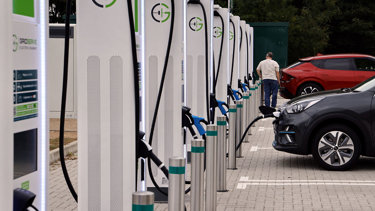What The Public Charge Point Regulations mean for charge point operators in the UK
Published: 25 November 2024
The UK’s rapid shift towards electric vehicles (EVs) is driving significant changes in the charging infrastructure landscape. The Public Charge Point Regulations came into force on 24 November 2023 and, one year on, several of the policy areas have now become applicable, reshaping the industry and having a significant impact on charge point operators.

Understanding these regulations is crucial to navigating the evolving EV charging market and ensuring your business remains competitive.
Regulations now applicable for charge point operators
Although the regulations came into effect a year ago, the Government set a one-year lead time to allow charge point operators time to comply. That means these policy areas now apply to charge point operators.
- Contactless: New public charge points of 8kW and above and existing charge points of 50kW and above must offer contactless to consumers. There is a maximum fine of £10,000 per charge point for non-compliance.
- 99% reliability: Rapid charge points must be 99% reliable, measured as an average across each charge point operator’s rapid network over the calendar year. There is a maximum fine of £10,000 per network for non-compliance.
- Helpline: A free to use 24/7 staffed telephone helpline must be available and advertised at all charge points. There is a maximum fine of £10,000 per charge point for non-compliance.
- Open data: All data must be accurate, and charge point operators must use the Open Charge Point Interface (OCPI) to hold and open their data. There is a maximum fine of £10,000 per charge point for non-compliance.
Pricing transparency – the requirement to clearly display the maximum price of a charging session in pence per kilowatt hour – has been applicable since 24 November 2023.
Interpreting the impact on charge point operators
The Public Charge Point Regulations introduce a range of requirements that will directly impact charge point operators.
- Planning permission: While many installations may be permitted development, larger or more complex projects will likely require planning permission. This can add time and cost to your projects.
- New builds: New homes and commercial buildings must now include EV charging infrastructure.
- Public charge points: There are set standards for accessibility, reliability, and payment methods. As a charge point operator, you’ll need to ensure your infrastructure meets these standards to avoid penalties.
- Maintenance requirements: Greater emphasis is placed on the maintenance of public charge points. Operators will need to adhere to strict maintenance schedules, ensuring that chargers are consistently operational and meet performance standards. This will likely involve regular inspections, software updates, and fault repairs.
Maintenance matters
With our experience in installing electric vehicle charge points and carrying out ongoing maintenance, let’s understand how charge point operators will need to look after their infrastructure.
The regulations place a strong emphasis on the maintenance of public charge points. This is crucial to ensuring consistent reliability and performance, enhancing the overall user experience. However, these stringent maintenance requirements can have significant implications for charge point operators.

Industry data suggests that the average maintenance cost per charger per year is between £500 and £1,500, depending on charger type, usage, and location.
Regular inspections, software updates, and fault repairs demand skilled technicians. The cost of labour varies based on complexity and frequency. Replacement parts, such as charging cables, connectors, and electrical components, can be expensive. Consumables like cleaning solutions and lubricants further contribute to the overall maintenance cost.
Keeping the charging infrastructure software up to date is essential for security and performance. Software updates, however, may require specialised tools, technical expertise, and downtime for the chargers.
Regular maintenance tasks like cleaning, inspection, and software updates require dedicated time and resources, which can disrupt operations and impact the availability of charging points.
While routine maintenance work can often be performed within a few hours, more significant repairs like replacing faulty components or addressing hardware issues may require several days of downtime. Unforeseen breakdown and equipment failure can lead to additional costs for emergency repairs and replacement parts, while disrupting service and inconveniencing users.
To ensure adherence to regulations, charge point operators may need to undergo regular audits and inspections, which can be time-consuming and require additional administrative tasks.
By understanding the potential costs and time implications of maintenance, charge point operators can budget effectively and plan their maintenance schedules efficiently. Investing in proactive maintenance, efficient repair strategies, and real-time monitoring systems can minimise downtime, reduce costs, and enhance the overall reliability of charging infrastructure.
The future of electric vehicle charging in the UK
The UK’s ambitious EV targets present a complex landscape for charge point operators, fraught with various challenges.
Grid integration
As the number of electric vehicles on UK roads continues to surge, the strain on the electricity grid will intensify. To mitigate this risk, careful planning and the implementation of smart charging technologies are essential. By optimising charging times and coordinating with grid operators, charge point operators can help manage peak demand and avoid overloading the grid.
Intensifying competition
The EV charging market is becoming increasingly competitive, with new players entering the scene. To differentiate their businesses and attract customers, charge point operators must focus on providing an exceptional customer experience, ensuring reliable infrastructure, and offering innovative solutions.
Regulatory complexity
The rapidly evolving regulatory landscape poses significant challenges for charge point operators. Keeping abreast of the latest regulations, standards, and compliance requirements can be time-consuming and complex. To navigate this complexity, operators should work closely with industry associations and regulatory bodies to stay informed and advocate for policies that support the growth of the EV charging sector.
Charge point operators have a pivotal role to play
The UK's ambitious EV charging infrastructure targets, coupled with stringent regulations, present a complex yet exciting landscape for charge point operators. But the new regulations will significantly impact business operations, from planning permission to public charge point standards.
To thrive in this dynamic market, it's crucial to stay informed about the latest regulatory updates, invest in robust technology, and prioritise great customer service. By optimising charging infrastructure, leveraging smart charging technologies, and exploring innovative business models, charge point operators can position for long-term success.
As the UK continues to transition to a low-carbon economy, charge point operators have a pivotal role to play in shaping the future of sustainable transportation.
More from our Knowledge Hub
 Case study
Case studyGroup companies Detectronic and Oneline combine to deliver hydraulic improvements at Meole Brace Golf Course
 Insights
InsightsA prevention-first future: Our response to the government’s white paper, 'A New Vision for Water'
 Insights
InsightsFrom insight to impact: Delivering a solution to pollution at WWT Wastewater 2026
 Case study
Case studySafeguarding data centre continuity through strategic DSEAR risk assessment
Environmental compliance today, creating a sustainable tomorrow
Helping you reduce risk to the environment and your operation by managing assets compliantly while achieving commercial, ESG, and net-zero goals.
Contact our experts
